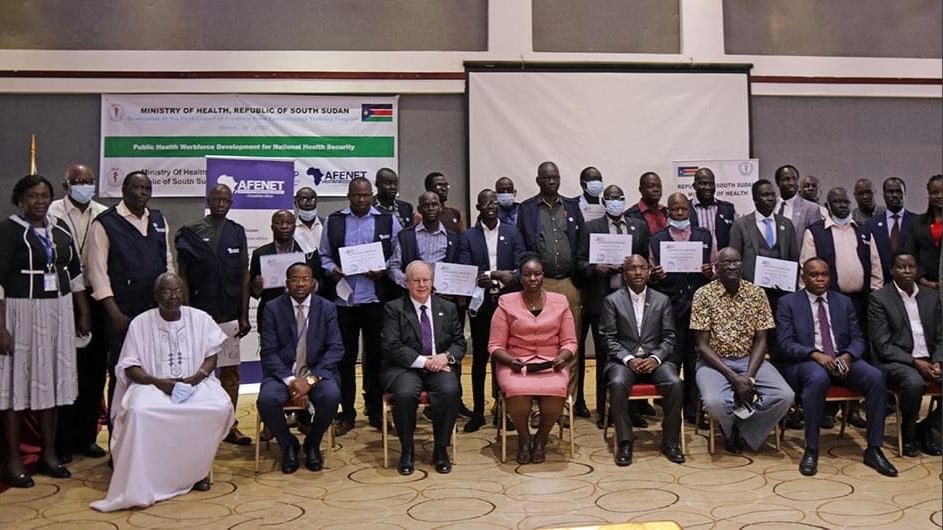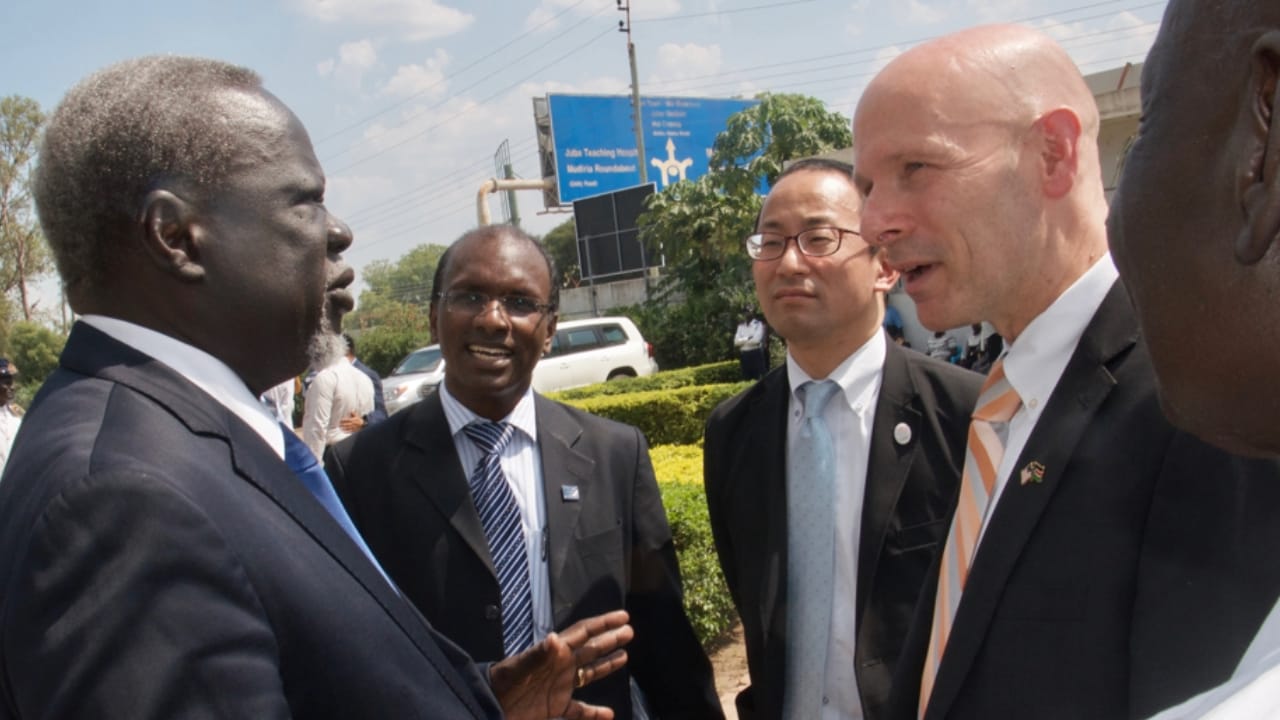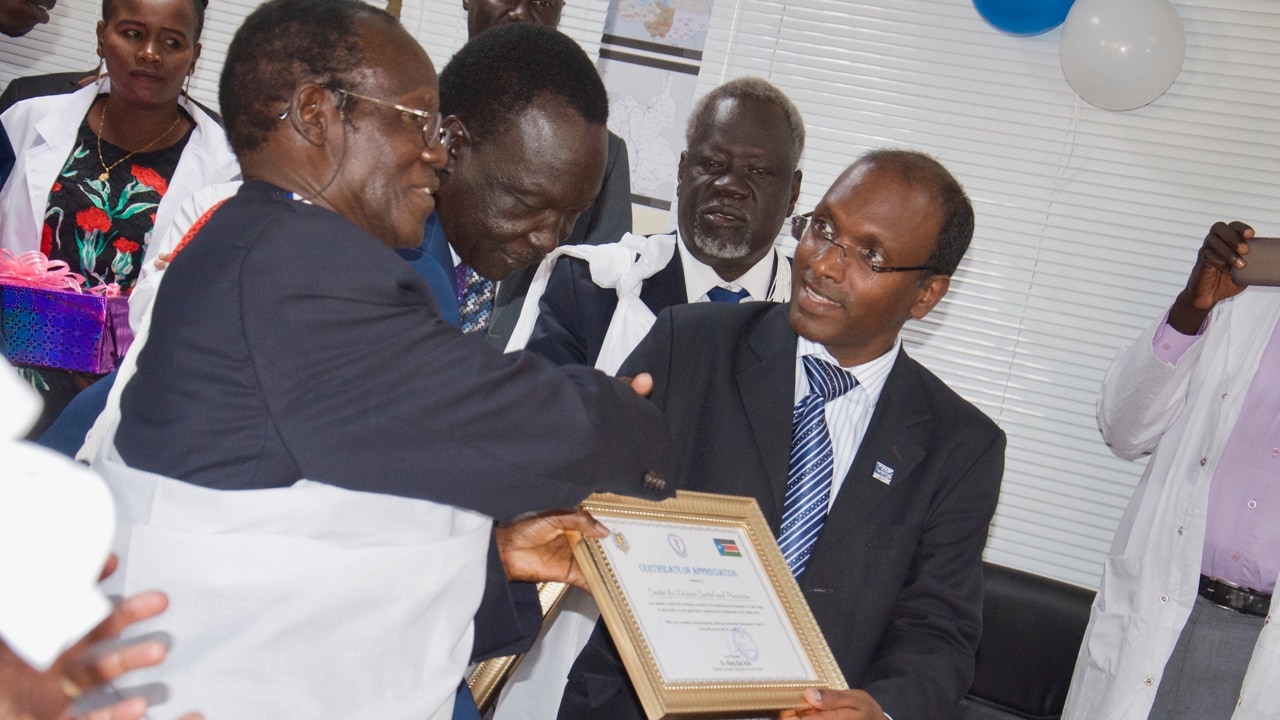At a glance
- U.S. CDC in South Sudan provided training and assistance to increase South Sudan's capacity to respond to disease outbreaks.
- CDC helped stand up South Sudan's Field Epidemiology Training Program (FETP) in 2021.
- CDC supported the establishment of South Sudan's public health emergency operations center in 2018.

Introduction

The Republic of South Sudan is the newest country in the world. South Sudan gained independence from Sudan in 2011 after nearly five decades of conflict. Since 2017, Dr. Sudhir Bunga has served as the U.S. CDC’s Director in South Sudan. Early in his role, he realized that there were significant gaps in South Sudan’s national public health workforce.
Challenges
In 2017, multiple challenges limited South Sudan’s ability to rapidly respond to disease outbreaks. Public health services were delivered out of healthcare facilities that lacked the necessary infrastructure and staff. This was due to a lack of a well-trained public health workforce. Also, there was no national public health emergency operations center (PHEOC) or incident management system (IMS) to coordinate outbreak responses.
To address these challenges, the CDC South Sudan country team worked closely with CDC headquarters. The team assessed how available resources could be used to strengthen health systems and build workforce capacity in South Sudan. CDC is a key implementing agency of the U.S. President's Emergency Plan for AIDS Relief program (PEPFAR). PEPFAR is the largest commitment by any nation to address a single disease in history. Together with global partners, PEPFAR aims to eliminate the global HIV pandemic by 2030.
The CDC South Sudan team thoughtfully leveraged PEPFAR resources to offer key training and assistance. This support significantly expanded South Sudan's public health workforce capacity on a national scale.
Interventions
Training field epidemiologists to lead outbreak investigations
The World Health Organization (WHO) recommends one trained field epidemiologist per 200,000 population. This is the optimal workforce development target for complying with the International Health Regulations. In the absence of standard accredited field epidemiology courses, South Sudan lacked the needed infrastructure and capacity to achieve this target.
CDC's Field Epidemiology Training Program (FETP) trains public health professionals to track, contain, and eliminate outbreaks before they become epidemics. When health threats strike, these trained "disease detectives" investigate and apply their knowledge to keep people from getting sick.
Previously, mid-managerial professionals in South Sudan traveled out of the country to participate in Kenya's FETP program. However, in 2021, CDC partnered with the South Sudan Ministry of Health (MOH), WHO, and African Field Epidemiology Network (AFENET) to establish the first FETP in South Sudan, at the frontline (basic) tier. FETP-Frontline (F-FETP) has rapidly increased workforce capacity for outbreak responses by teaching fundamental skills in public health surveillance, investigation, and response.
FETP transformed the outbreak response landscape in South Sudan, bringing much-needed methodological approaches, real-time reporting, and discipline to outbreak investigations.
- Joel Katoro, CDC South Sudan Senior Laboratory Sciences Advisor
Establishing the national PHEOC and the first IMS to manage outbreak responses
To strengthen South Sudan's emergency management capabilities, CDC supported the formation of a PHEOC in 2018 and first IMS in the country in 2019. Since 2018, CDC has trained approximately 80 public health professionals in IMS principles. These trainings helped establish the first IMS and provided capacity for cascade trainings from master trainers to state- and county-level staff. CDC also provided technical assistance to South Sudan's MOH in surveillance, laboratory systems, border health, risk communications, and advocacy.

Impact
To date, 144 staff from MOH and WHO have completed South Sudan's F-FETP. In 2022, for the first time since South Sudan's independence, graduates from South Sudan's F-FETP led a series of investigations. They responded to outbreaks of anthrax, hepatitis E, malaria, measles, meningitis, and acute watery diarrhea disease in the country.
F-FETP graduates have also helped improve integrated disease surveillance and reporting to inform public health decision-making. A second tier of FETP, FETP-Intermediate, launched in June 2023 with support from the Global Fund. Through FETP, CDC and partners continue to strengthen outbreak response capacity in South Sudan.
The IMS team at the South Sudan National PHEOC has led and coordinated several epidemic preparedness efforts and outbreak responses. The IMS-led National Steering Committee was instrumental in strengthening South Sudan's Ebola preparedness during the 2018 Ebola outbreak in the neighboring Democratic Republic of Congo. Actions included:
- Establishing a dedicated alert phone number to report suspected cases.
- Deploying rapid response teams to the most at-risk states and counties.
- Providing trainings on case investigation and contact tracing.
- Establishing port-of-entry screening sites.
- Leading a full-scale simulation exercise.
In mid-2022, with support from CDC, South Sudan’s MOH launched an IMS for HIV/AIDS to accelerate progress towards HIV control. From 2022-23, CDC and WHO provided technical assistance to stand up a three-month applied course on simulation exercises—a first of its kind in the country—attended by nearly 30 participants.
South Sudan's PHEOC remains a highly efficient and effective pillar of the MOH, supporting the country's response to several public health emergencies.
- Dennis Lodiongo, CDC South Sudan Laboratory Sciences Advisor
Looking ahead

CDC's investments toward building workforce capacity are now seen as a necessary and well-directed priority by South Sudan's government counterparts as well as donor-development partners. Some initiatives will be sustained and funded to a larger scale by other agencies and organizations in South Sudan.
The progress made demonstrates that, even in a complex operating environment and with resource constraints, health and public health program management capabilities can be supported and strengthened.
Although the small and mighty team of CDC South Sudan has made big strides, the team has [quoting Robert Frost] '... miles to go before we sleep...'
